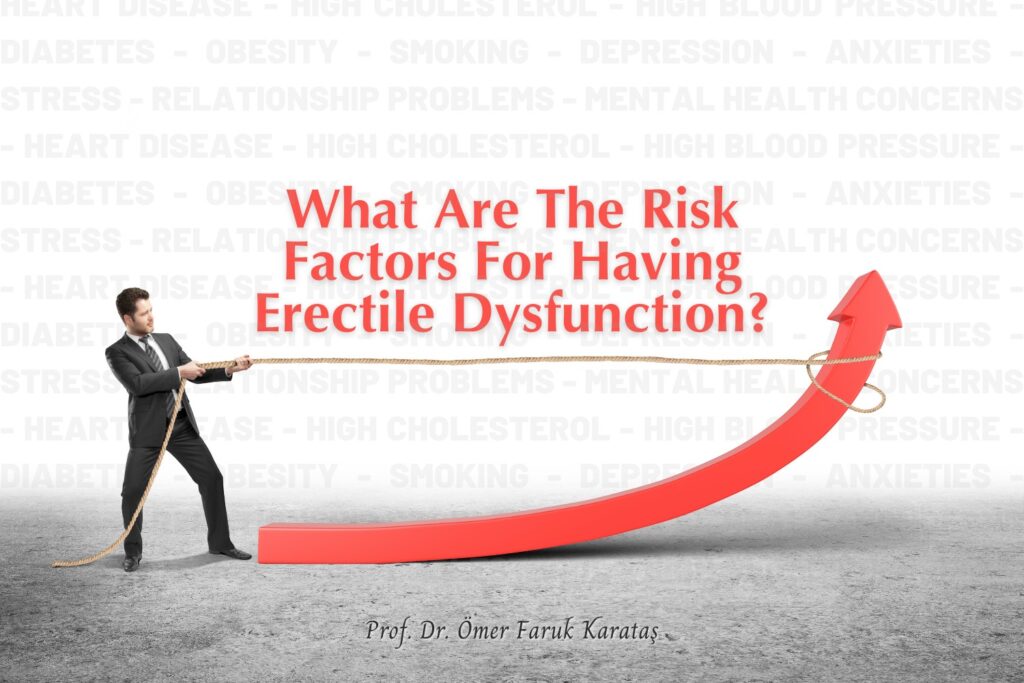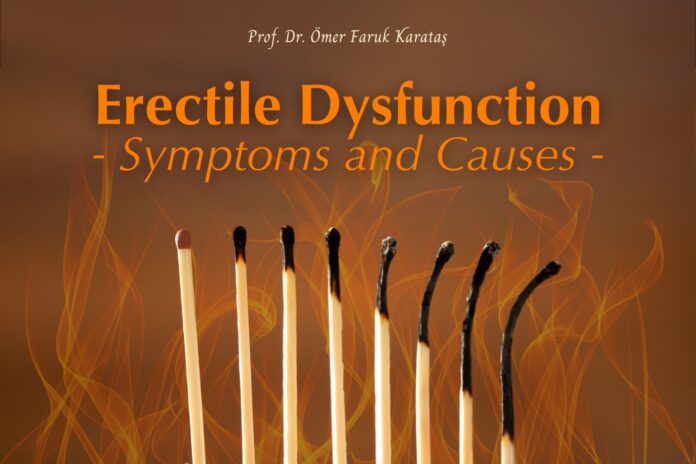Sexual dysfunctions can be defined as decreased pleasure in sexual intercourse experiences at some point in the life of both men and women.
Erectile dysfunction, which is one of the most common sexual dysfunctions for men, is the situation where a sufficient hardness in the penis cannot be obtained for sexual activity or if it is achieved, it cannot be maintained for a long time.
Erectile dysfunction can be seen at a rate of 50% in men aged 40 and over. This is a common problem and increases with advancing age.
What is erectile dysfunction?
Erectile dysfunction, known as the inability to achieve or maintain sufficient penile rigidity for sexual intercourse, is not always a cause for concern if it is not experienced frequently.
In addition, if the erection problem is constantly experienced and negatively affects sexual life, this can cause stress, loss of self-confidence and relationship problems.
Erectile dysfunction in men can also be a sign of a health condition that requires treatment, such as heart health or diabetes. In such a case, the problem of erection will disappear with the treatment of the main disease.
What are the causes of erectile dysfunction?
Many of the erectile dysfunctions have underlying physical and psychological causes. However, in many cases, the cause of erectile dysfunction is a physical problem.
The problems can be listed as follows:
- Cardiovascular diseases and hypertension,
- Injuries and surgical interventions related to the spinal cord or pelvic region,
- Treatment of prostate cancer or enlarged prostate gland,
- High cholesterol and high blood pressure,
- Sleeping disorders,
- Use of alcohol and tobacco products or drug addiction,
- Epilepsy, stroke, Parkinson’s or MS,
- Diseases such as kidney failure and cirrhosis,
- Some prescription drugs,
- Multiple sclerosis,
- Obesity or metabolic syndrome,
- High cholesterol or diabetes,
- Sleep apnea, COPD and similar lung diseases,
- Atherosclerosis or peripheral vascular diseases,
- Thyroid diseases and endocrinological diseases,
- Peyronie’s disease (a disorder of the tissue that gives the penis its shape.
In addition to these, it is possible to talk about some psychological factors that cause erectile dysfunction. So much so that the mechanism that provides an erection begins in the brain, which is triggered by feelings of sexual excitement.
For this reason, some situations may cause erection problems by directly affecting the emotional state that occurs with sexuality.
The following situations are examples of such situations:
- Depression, anxiety, or other mental health conditions,
- A stressful life,
- Relationship problems with the partner and the resulting anxiety.
Can erectile dysfunction in men be a symptom of other important diseases?
The most common physical cause of erectile dysfunction is vascular diseases. Vascular diseases affect the amount of blood reaching the penis and providing erection.
At the same time, the retention of blood in the penis and thus the continuation of the erection may also be affected. Hardening of the veins and any disease affecting the vascular system is a risk factor for erectile dysfunction. Atherosclerosis is a serious problem especially for men over the age of 50.

What are the risk factors for having erectile dysfunction?
Those over the age of 40 and those with a certain medical history are more likely to encounter erectile dysfunction. Various risk factors can contribute to erectile dysfunction, including:
- Medical conditions, especially diabetes or heart conditions,
- Tobacco use, which restricts blood flow to veins and arteries
- Being overweight (obesity),
- Receiving certain medical treatments, such as prostate surgery or radiation therapy for cancer
- Injuries that damage the nerves or arteries that control erection, especially
- Antidepressants, antihistamines, and some medicines used to treat high blood pressure, pain, or prostate conditions
- Psychological conditions such as stress, anxiety or depression
- Drug and alcohol use.
Home remedies for erectile dysfunction
It is important for people who realize that they have difficulty maintaining an erection not to panic and instead try to examine themselves to understand why they have an erectile dysfunction.
If the problem persists, a specialist urology doctor should be consulted.
Sometimes, erectile dysfunction may occur due to the side effects of drugs related to chronic diseases. In this case, your doctor may find the remedy to reduce the dosage of the drug or turn to a different drug.
However, it will also be beneficial to eat healthy, sleep well and exercise regularly. Regular exercise helps keep the body fit and also helps reduce stress levels.
Exercise also makes use of stored fats in the body and makes it less likely to experience medical problems that can later lead to erectile dysfunction. It turns out that regular exercise can improve erectile dysfunction in up to 30% of obese men.
The vast majority of men experience erectile dysfunction from time to time and its frequency increases as they age, so there is no shame in seeking help. In this process, the contribution of being more positive in thoughts and actions will be great.
What are the special diagnostic tests used to investigate erectile dysfunction?
In addition to the diagnosis of erectile dysfunction, the determination of the underlying cause is of great importance for its treatment. For this reason, after your medical history and examination, your doctor may request some tests according to the findings he/she will obtain. Some of them can be listed as follows:
- Blood and Urine Examinations: In order to reveal the causes of erectile dysfunction, blood count, tests related to cholesterol and diabetes diseases, hormone tests, tests that reveal the condition of organs such as kidney and liver may be requested.
- Color Doppler: This test analyzes blood flow through blood vessels in the penis.
- Ultrasound: This imaging test uses high-frequency sound waves to create an image of the organs. In the case of erectile dysfunction, this test can show poor blood flow or disorders in the internal structure of the penis.
- Psychological evaluation: Your doctor may ask questions to assess for depression, anxiety, or other psychological conditions.
- Biotesiometry: This test uses electromagnetic vibration to test the nerve function that produces an erection as a result of stimulation.
- NPT (Nocturnal Penile Tumescence) Test: In this test, also known as the night test, a special device placed around the penis can determine whether the patient has an erection during sleep.
What is the most effective treatment for erectile dysfunction?
Treatment of erectile dysfunction varies according to the underlying problem. If you have a problem such as diabetes or heart disease, your doctor will first refer you to a specialist for the treatment of these diseases.
Apart from this, methods such as topical treatment methods, oral treatment applications, vacuum devices, penile injection treatment can be tried.
In addition, shock wave therapy is a very common method in erectile dysfunction. In this treatment method, low-intensity shock waves are sent to the penis at short intervals, thereby causing minor damage to the penile tissue. The aim of this treatment is to trigger the formation of new vessels to repair the damage. The newly formed blood vessels can provide the necessary blood flow to the penis.
If a solution cannot be found with all these, penile prosthesis implantation is recommended to the patient.
What are the surgical methods used in patients with erectile dysfunction?
In erectile dysfunction, surgical applications are applied as a result of the failure of all treatments.
During erectile dysfunction surgery, one of two types of prosthesis is placed into the penis.
The first of these types of prostheses is the semi-rigid prosthesis. This prosthesis, which is in the form of two bendable rods, is placed in the chambers that ensure the erection of the penis.
The inflatable prosthesis, which is the other type of prosthesis, is a device that contains liquid and is placed inside the penis, and draws liquid from a pump placed in the scrotum when necessary.
These days, the inflatable prosthesis is the most commonly preferred type of prosthesis.
Can herbal remedies be a solution to erectile dysfunction?
Herbal medicines are the most preferred in the market and the reason for their increasing popularity is that they are claimed as having no side effects.
However, herbal medicines also have some aspects that need attention. Especially unconsciously applied cures can have serious side effects in people who are already using drugs.
While some herbs may provide some benefit in the treatment of erectile dysfunction, these herbs have not been adequately tested for their effectiveness and safety in the treatment of erectile dysfunction. Random use of these drugs without consulting a specialist can cause many different ailments.




